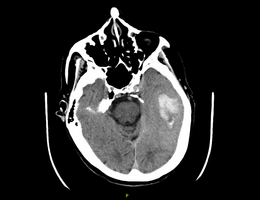

Dr. Andrea Salcedo is the lead author of the study that examines how elevated insulin levels are associated with abnormal bleeding patterns during menstruation
When women visit their gynecologist for irregular or heavy periods, many expect a hormone panel, a prescription for birth control, or possibly a recommendation for surgery. A new Loma Linda University Health study suggests these symptoms may point to something much deeper: early signs of metabolic dysfunction and future cardiovascular disease risk.
Andrea Salcedo, DO, assistant professor of gynecology and obstetrics at Loma Linda University School of Medicine, is the lead author of "The Uterus is an End Organ: A Preliminary Study of the Association Between Abnormal Uterine Bleeding and Hyperinsulinemia," published in the journal Menopause. The study is among the first to examine how elevated insulin levels, often a result of metabolic stress or prediabetes, are associated with abnormal bleeding patterns.
Salcedo began noticing a pattern in her clinic. Women with abnormal uterine bleeding (AUB) such as irregular, prolonged, or heavy menstrual cycles often also had elevated risk factors for heart disease, even if those weren't immediately apparent.
"I started realizing these menstrual symptoms weren't just hormonal," said Salcedo. Many of these women had early signs of inflammation, something we know contributes to heart, kidney, and vascular disease. But, the uterus is rarely part of that conversation."
Insulin, a hormone that helps regulate blood sugar, is typically only measured in relation to diabetes. But it also spikes under chronic stress and with high consumption of processed carbohydrates. When elevated, it can disrupt ovulation and trigger inflammation throughout the body, including in the uterus.
"Every woman knows that when she's under stress, her period might change," Salcedo said. "But what many don't know is that insulin is a key biological messenger behind that."
The uterus, she explained, is made of smooth muscle. The same type of tissue that lines arteries. Just as long-term inflammation can harden arteries in heart disease, it may cause structural changes in the uterus, such as fibroids or heavy menstrual bleeding.
Her cross-sectional study of 205 women aged 18 to 54 found a strong association between elevated insulin levels and abnormal uterine bleeding. When adjusting for body mass index (BMI), the relationship weakened, suggesting a complex interplay between weight, insulin, and menstrual health.
Salcedo says that nuance points to a broader issue in gynecologic care, a focus on estrogen and progesterone to the exclusion of other systemic factors. She hopes this research encourages providers to include fasting insulin tests as part of evaluating menstrual irregularities and to consider lifestyle interventions like nutrition, stress reduction, and muscle-building exercise before defaulting to medication or surgery.
"A lot of women leave the doctor's office frustrated. They're told their hormones are normal, but they don't feel normal. This helps explain why."
While the study does not prove causation, Salcedo believes it could be a turning point in how menstrual symptoms are understood and treated.
Future studies underway include analyzing belly fat via imaging and its relationship to fibroid development, as well as examining insulin levels during pregnancy and their connection to birth outcomes.
From breast health to gynecologic care, treatment of pelvic pain and female cancers to menopause management, and beyond, Loma Linda University Health cares for the whole woman. To learn more about women's health, visit online.

